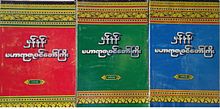 2003 three-volume reprint of Hmannan | |
| Author | Royal Historical Commission |
|---|---|
| Original title | ‹See Tfd›မှန်နန်း မဟာ ရာဇဝင်တော်ကြီး Hmannan Maha Yazawindawgyi |
| Language | Burmese |
| Series | Burmese chronicles |
| Genre | Chronicle, History |
Publication date | September 1832[1] |
| Publication place | Kingdom of Burma |
Published in English | 1923 (to Pagan Dynasty) |
| Media type | |
| Preceded by | Yazawin Thit |
| Followed by | Dutiya Yazawin |
Hmannan Maha Yazawindawgyi (Burmese: မှန်နန်း မဟာ ရာဇဝင်တော်ကြီး, pronounced [m̥àɰ̃náɰ̃ məhà jàzəwɪ̀ɰ̃dɔ̀dʑí]; commonly, Hmannan Yazawin; known in English as the Glass Palace Chronicle) is the first official chronicle of Konbaung Dynasty of Burma (Myanmar). It was compiled by the Royal Historical Commission between 1829 and 1832.[1][2] The compilation was based on several existing chronicles and local histories, and the inscriptions collected on the orders of King Bodawpaya, as well as several types of poetry describing epics of kings. Although the compilers disputed some of the earlier accounts, they by and large retained the accounts given Maha Yazawin, the standard chronicle of Toungoo Dynasty.[2]
The chronicle, which covers events right up to 1821, right before the First Anglo-Burmese War (1824–1826), was not written purely from a secular history perspective but rather to provide "legitimation according to religious criteria" of the monarchy.[3] The "most important development" in Hmannan was the replacement of the hitherto prevalent pre-Buddhist origin story of Burmese monarchy with one that links the origins of the monarchy to the clan of the Buddha and the first king of Buddhist mythology, Maha Sammata.[2][4]
Hmannan was the main chronicle referenced by early European scholars to write the earliest versions of Burmese history, and it still is the main standard chronicle in the study of Burmese history.[5]